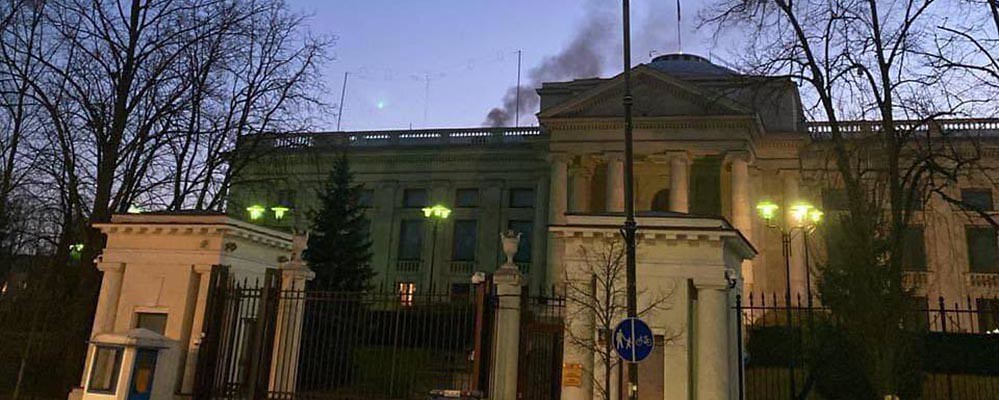Russian embassy in Warsaw mimics the one in Kiev: Is Putin preparing to attack Poland?
The Russian government has adopted an increasingly aggressive policy against the West, and its most hated country, after Ukraine, is the Republic of Poland.
Poland's prominent role in the international response to the invasion of Ukraine
Although many ignore it, Poland has been warning of the threat posed by Vladimir Putin for years, but unfortunately the world turned a deaf ear to his warnings. After the Russian invasion of Ukraine, the Polish government has assumed a leading role in the international response, being one of the most pressing for the implementation of sanctions against Russia. Yesterday, supporting the request made by Volodymyr Zelensky a week ago to declare Russia a "terrorist state", the Prime Minister of Poland stated: "Russia is indeed terrorising Ukraine." Mateusz Morawiecki denounced that Russian troops are "terrorising the civilian population, killing innocent women, children and elderly people." For that reason, the head of the Polish government said that "we should indeed" declare Russia a terrorist state.
Morawiecki also announced that he will ask the international community for "more sanctions" against Russia, adding that those already approved are "unprecedented, far-reaching, but definitely insufficient". The Polish Prime Minister also noted that Russia is now "a totalitarian state" and unless the West maintains its "economic combat", Putin will go further with his aggressive actions: "A year or two from now… he will go for Helsinki, Vilnius, Warsaw, Bucharest, maybe Berlin, too."
The threats that Russia has been launching against Poland
Morawiecki's words are not an exaggeration. On March 13, Russia attacked a Ukrainian military base very close to the Polish border, an attack that was interpreted as an attempt by the Russian government to intimidate the Poles. Last week, the Russian pro-government media Pravda.ru, controlled by a politician from Putin's party, threatened Poland with an invasion. He did so after appealing to Stalin and justifying the Soviet invasion of Poland in 1939, and using the very word with which the Kremlin has disguised its infamous invasion of the Ukraine: "It is time to carry out the denazification of Poland."
This threat is not an isolated case. Russian state television has also broadcast a program in which Warsaw was threatened with a nuclear attack. It is warmongering rhetoric that is becoming increasingly common in the Russian media. In line with that rhetoric, this week Duma defense committee spokesman Vladimir Shamanov threatened Poland with attack if it interferes with Russia's invasion of Ukraine, referring to the Polish government's proposal to send forces of peace to that country.

Smoke in the Russian embassy in Warsaw, just like in the one in Kiev a week before the invasion
The escalation of Russian threats against Poland has been accompanied by a very significant fact. Last Tuesday, March 22, two days before Poland announced the expulsion of those 45 Russian spies, smoke could be seen rising from the Russian Embassy in Warsaw, a sign that they were possibly burning documents to leave the embassy soon.
On the causes of the smoke, the Twitter account that posted the photo, OSINTdefender, noted: "the same thing was done at the Russian Embassy in the Ukrainian Capital City of Kyiv right before the Invasion of February 24th." Indeed, and as that Twitter user points out, on February 17 smoke was seen coming out of the Russian Embassy in Kiev (below these lines you can see the video). Just a week later the Russian invasion of Ukraine began.
A Russian attack on Poland would force NATO to respond
Due to its status as a member of NATO, if Poland were attacked by Russia, the Atlantic Alliance would be forced to respond, since Article 5 of the North Atlantic Treaty considers that any attack against one of its member countries is an attack against all. If Russia has already demonstrated the deficiencies of its army in the invasion of Ukraine, confronting the entire NATO is something that would be beyond all logic. But logic and reason fail to predict the effects of Vladimir Putin's nationalist fanaticism.
|
Don't miss the news and content that interest you. Receive the free daily newsletter in your email: Click here to subscribe |
- Most read
- A report that shows how a Boeing B-52 Stratofortress strategic bomber works
- Princess Leonor at the Naval Military School and some notes on the female cap
- An excellent documentary shows the inside of the B-17 Flying Fortress bomber
- Poland is now a little closer to becoming the first European operator of the F-15 fighter
- Lenin: numbers, data and images of the crimes of the first communist dictator
- Sierra Army Depot, a huge United States base with hundreds of Abrams tanks stored
- The ten oldest national flags in the world that are still in use today

 ES
ES





Opina sobre esta entrada: